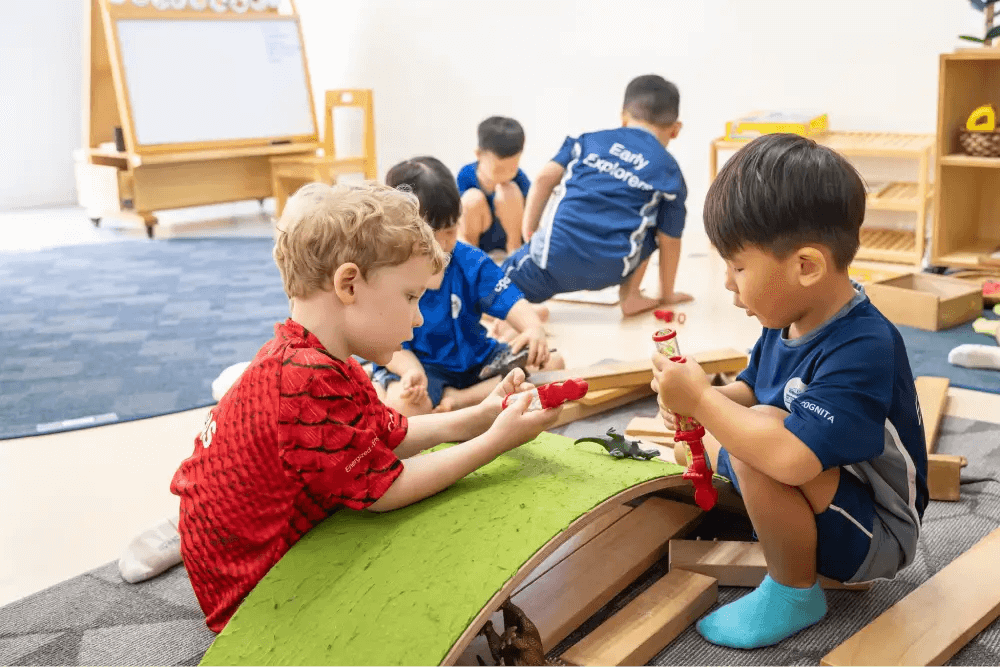Strategies to Boost Cognitive Development in Early Childhood
Early childhood is a critical period for cognitive development, where the foundation for learning, thinking, and problem-solving is laid. During these formative years, the experiences and activities children are exposed to can significantly influence their intellectual growth and future success. In this blog, we’ll explore effective strategies and activities that parents and caregivers can use to boost cognitive development in young children, helping them build strong mental capabilities and a love for learning that will last a lifetime.
What is Cognitive Development in Early Childhood?
According to American Psychological Association, cognitive development refers to the growth and maturation of all thinking processes, including perceiving, concept formation, remembering, problem-solving, imaging, and reasoning. (1)
It is crucial for parents to nurture their child’s cognitive development from birth, as this lays the foundation for academic success and overall achievement in life.
The Importance of Cognitive Development in Children
Cognitive development in early childhood is essential because the brain develops more rapidly during this period than at any other stage in life. Early cognitive development helps solidify essential concepts like language, object permanence, and numeracy, laying a solid foundation for future educational success.
A child’s knowledge of the alphabet by kindergarten is a strong predictor of their reading ability in later years, emphasizing the importance of cognitive changes in early childhood. Parents should monitor their children’s developmental milestones to ensure they are on the right path to successful learning and development.

Language is a cornerstone of early cognitive development. From infant babble to toddler storytime, every interaction builds neural pathways and shapes how children think, communicate, and connect.
Explore our article on language development in early childhood to see how everyday communication fuels brain growth and supports key milestones.
Stages of Cognitive Development in Children
Cognitive development in children has multiple stages, each marked by changes in their intelligence and problem-solving abilities.
- Birth To Two Months
During this stage, infants start to explore their environment with a focal range of about 10 inches. Examples of cognitive development in early childhood include their ability to follow moving objects and recognize familiar faces. They also actively seek stimuli and respond to new or changing sounds and sights.
- Two To Six Months
Between two and six months, infants engage in purposeful sensory exploration. They often stare at their hands and reach for body parts, developing concepts of self-awareness. At this stage, as they master motor abilities, they repeat actions that produce desired outcomes. For example, they may press a button repeatedly to light up their toys.
- Six To Twelve Months
Toddlers develop object permanence, which enables them to search for fully or partially hidden objects and engage in peek-a-boo games. As their motor skills for kindergarten improve, they explore their environment by reaching, holding, and dropping objects to learn cause and effect through trial and error.
- Twelve To Eighteen Months
At this stage, advancing motor skills allow children to walk, access, hold, and release objects. They start to imitate sounds and gestures. Due to object permanence and memory development, they can track moving things and find items after witnessing displacements.
- Eighteen Months To Two Years
Improved memory and frontal lobe development lead to advanced planning and problem-solving skills. Children achieve full object permanence, enabling them to anticipate where objects are hidden without seeing displacements. They can also imitate activities like feeding their toys or doing housework.
- Two To Five Years
Between two to five years old, children enter the preschool stage. They may have imaginative explanations, like the sun setting because it feels tired. Their perception tends to dominate over logical reasoning, and they may struggle with concepts like conservation. Instead, they understand simple time concepts, counting, and shape recognition. By the age of five, their numeracy skills have become more advanced.
- Six To Twelve Years
Children develop scientific reasoning, which enables them to understand more complex concepts, like the physical laws of conservation. Initial literacy skills, like basic numbers and reading, improve, too, as they can read for learning and shift from spelling to writing composition.
- Twelve Years And Older
Adolescents manage to apply logic abstractly and systematically to solve complicated problems. This capacity extends to emotional and personal issues in later adolescence and early adulthood. Social cognition matures, while future-oriented thinking becomes increasingly significant. (2)

Activities to Enhance Your Child’s Cognitive Growth
Parents can support early childhood cognitive development by engaging their children in activities that stimulate their thinking and learning. The ideas below can effectively address this goal.
Sing Songs
Best For: Toddlers
Songs are prevalent in preschool classrooms. Sing-along songs serve as didactic and pedagogical tools to enrich the curriculum. Schools often use songs that involve counting to help toddlers practice numeral concepts in an engaging way. (3)
Puzzles
Best For: Children from 3 to 6 years old
Jigsaw puzzles enhance cognitive development by promoting the recognition of patterns, spatial reasoning, and problem-solving. The skills developed through puzzle-solving set a solid foundation for more complex cognitive tasks. (4)
Mazes
Best For: Children from 3 to 6 years old
Like matching games, mazes exercise working memory. These games also activate perceptual organization, spatial learning, decision-making, general reasoning, and visual-motor coordination.
Matching Games
Best For: Children from 7 to 9 years old
Working memory involves the retention of a limited amount of information in an easily accessible format, supporting both learning and cognitive development. Matching games enhances working memory while providing an enjoyable means of education. (5)
Stroop Effect Games
Best For: Children from 7 to 9 years old
Stroop effect tasks involve identifying the ink color used to print a word rather than reading the word itself. According to Stroop’s research, individuals experience delayed reaction times when the ink color conflicts with the word’s semantic meaning. For example, reading “red” in yellow takes longer than reading the same word when printed in red. Hence, the Stroop effect game requires considerable focus. (7)

Encourage Cognitive Skills with ISHCMC
Cognitive development in early childhood lays the groundwork for future learning and success. Parents and educators can implement the strategies discussed to enhance children’s cognitive skills and provide a supportive foundation for their growth.
At ISHCMC, our IB programmes ensure a balanced and immersive educational experience for young learners. Our curriculum focuses on active engagement, reflection, and opportunities for practice, which are essential for cognitive growth. Contact ISHCMC today to learn more about our innovative approach to early childhood education!
Resources:
- American Psychological Association. (n.d.). Cognitive development. In APA Dictionary of Psychology. Retrieved August 18, 2024, from https://dictionary.apa.org/cognitive-development
- Wilks, T., Gerber, R. J., & Erdie-Lalena, C. (2010). Developmental milestones: Cognitive development. Pediatrics Review, 31(9), 364-367.
- Gluschankof, C. (2007). Research and practice in early childhood music education: Do they run parallel and have no chance to meet? The case of preschool singing repertoire. In Proceedings of European Network for Music Educators and Researchers of Young Children, 27–31.
- Doherty, M. J., Wimmer, M. C., Gollek, C., Stone, C., & Robinson, E. J. (2021). Piecing together the puzzle of pictorial representation: How jigsaw puzzles index metacognitive development. Child Development, 92(1), 205–221.
- Cowan, N. (2014). Working memory underpins cognitive development, learning, and education. Educational Psychology Review, 26(2), 197–223.
- Venkatesan, S., & Lokesh, L. (2020). Studying the effects of Porteus Maze Test in children with learning disabilities. International Journal of Asia Pacific School Psychology, 1(2), 117–125.
- Styles, E. (1997). The psychology of attention. Psychology Press.




